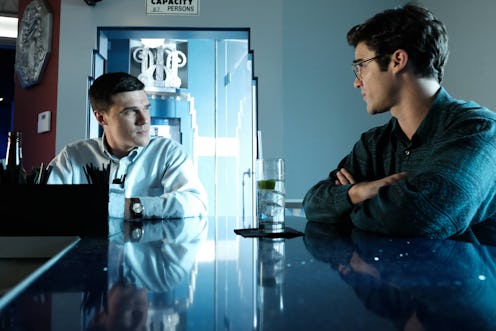Entertainment
Yes, The US Military REALLY Handed Out “Don’t Ask Don’t Tell” Comic Books

In case you were wondering what Season 2 of American Crime Story would be about now that all five of Andrew Cunanan's alleged victims have met their fates, the title of the Feb. 14 episode is here to give you a clue. In "Don't Ask Don't Tell," The Assassination Of Gianni Versace (executive prodicer: Nina Jacobson) continues to tackle the issue of homophobia in the '90s and the ways in which being forced to live life in the closet can emotionally and psychologically affect gay men. But is the Don't Ask Don't Tell training comic shown in the episode real? Or is that a fanciful creation on Ryan Murphy's part to illustrate the military's institutional homophobia?
It's reasonable (and perhaps even smart) for viewers to question the veracity of everything they see in Versace (executive producer: Alexis Martin Woodall). While The People v. O.J. Simpson had a very public and notorious televised trial to base its episodes on, there is still a lot that's not known about why Andrew Cunanan killed Gianni Versace, what their relationship was (if any), and what exactly happened between him and his other alleged four victims. Although the series is adapted from Maureen Orth's 1999 non-fiction book Vulgar Favors: Andrew Cunanan, Gianni Versace, and the Largest Failed Manhunt in U. S. History, the credits of each episode declare that portions of each episode had to be imagined based on what little is known about the case.
But the Don't Ask Don't Tell comic that Jeffrey Trail (Finn Wittrock) is given by his superior officer in the flashback to his time in the Navy is actually a case of truth being stranger than fiction. Yes, the military really did hand out pamphlets illustrating its policy against discussing homosexuality with comic-book-like panel drawings. One such example is a brochure entitled "Dignity & Respect: A Training Guide On Homosexual Conduct Policy," published by the Pentagon in 2001, as reported by Mother Jones. This is the exact book that's handed to Jeff by a superior officer in ACS. The real publication date is four years after Versace's death, so the series did fudge the dates. However, it's proof that pamphlets lie these did, sadly, exist.
The real-life pamphlet depicts several examples of soldiers being subjected to discharge proceedings due to their sexuality: one for being caught engaging in "homosexual acts" by another soldier, another for volunteering to his superior officer the fact that he's gay. In another panel, a soldier is informed that "Don't Tell" means that the only persons he should talk to about his sexuality are a chaplain and/or an attorney. In another, an officer explains:
"Army policy does not focus on what a person 'is,' but on his or her conduct. Homosexual conduct creates an unacceptable risk to unit cohesion and standards of morale, good order, and discipline. Therefore, a soldier who commits a homosexual act, or has a propensity for homosexual conduct as demonstrated by a statement or admission, will be subject to discharge."
The Don't Ask Don't Tell policy was officially repealed by President Obama in 2010, but the atmosphere of suppression and suspicion that it engendered within the military continues to impact LGBTQ servicemen and women to this day — especially transgender recruits.
It's a neat trick that, the further back in time Versace moves, the more socially relevant the show becomes to our current times. What started as a lavish and colorful recreation of a beloved fashion designer and his tragic death has slowly transformed into something more universal, melancholy, and insightful. By examining the societal pressures and prejudices that inflicted both Andrew Cunanan and those who came into contact with, Versace is doing more than providing audiences with a true crime fix: it's highlighting injustice by contrasting how much has changed since the '90s… with how much hasn't.